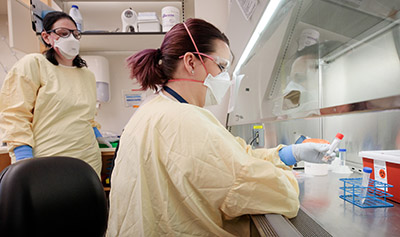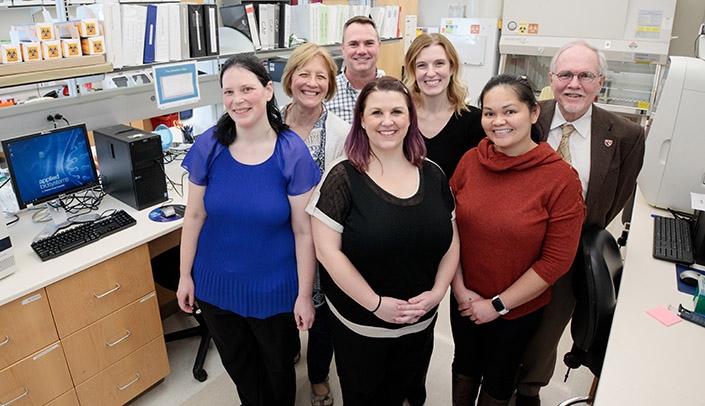During the Ebola virus disease outbreak in 2014, faculty and staff of the Nebraska Public Health Laboratory (NPHL) coordinated laboratory testing of patient specimens, making them the first state public health laboratory to test positive specimens in the U.S.
Now the lab is on the leading edge of the coronavirus response.
Laboratory tests that confirm the presence of coronavirus are a critical part of containing the virus. Technologists in the NPHL have been working long hours to keep up with the demand of testing specimens.
 |
Amanda Bartling (left) and Sarah Trotter simulate how they process specimens to test for presence of COVID-19. |
As a means to support the National Quarantine Unit, the NPHL had been working to provide diagnostic testing for COVID-19. Due to the repatriation of travelers from Wuhan for quarantine, the lab was one of the first to get the coronavirus kits from the Centers for Disease Control and Prevention, said Peter Iwen, Ph.D., director of the Nebraska Public Health Laboratory and professor in the UNMC Department of the Pathology and Microbiology.
However, before any new test can be used to test human specimens, regulations require that the laboratory perform a verification test to show that the laboratory can appropriately run the assay. NPHL was one of only three public health laboratories who could pass this initial verification process, which led to a national review of the CDC assay to determine why most labs were not able to internally verify.
Dr. Iwen said the lab worked with the CDC, which developed the test, to provide an external consultation to help define the problem, which ultimately led to a remanufactured kit. The new kit recently was released and further re-evaluated by a handful of public health laboratories, including the NPHL. The kit has now successfully been placed into most of the nation’s public health labs.
“We were able to complete the internal verification process by the second day after arrival of the quarantined travelers,” Dr. Iwen said. “Having diagnostic testing capabilities for the coronavirus in-house was important for us to provide to the care team a rapid turn-around-time for testing.”
Dr. Iwen said the NPHL is unique among public health labs because of its location on an academic health science center campus where scientists can provide support to the laboratory.
“We have the expertise and can look at different aspects of how a diagnostic assay works scientifically,” he said of the specimen kits used to test coronavirus. “We were able to trouble shoot the kit to help the CDC define what needed to be done to provide an assay that was able to be successful in the other labs.”
